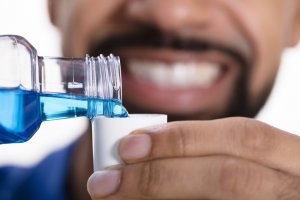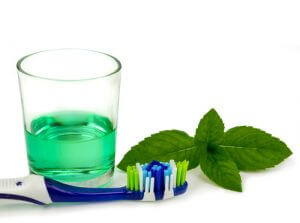If you are shopping around for the best mouthwash for sensitive teeth pain relief in the US, you may have realized there are quite a few types with different ingredients. Finding the right mouthwash for your needs is important, but how do you know which will benefit you the most?
You could choose any sensitive mouthwash, but it may not be the right one depending on the cause of your teeth and gum sensitivity. This article will discuss the different types of mouthwashes available, their ingredients, and the following topics and questions:
- What is teeth sensitivity, and what causes it?
- Which mouthwash is right for you?
- What ingredients are in a sensitive mouthwash?
- What is the best mouthwash for sensitive teeth?
- Is there anything else you can do to help with sensitivity?
Using a mouthwash alone will likely not be enough to manage sensitive teeth, but using it alongside a good oral hygiene routine can help.
The following table is a summary of all of the products that we will discuss in this article:
Best Mouthwash for Sensitive Teeth | ||
Listerine Sensitivity | Dipotassium blocks dentin tubules, shielding dentin from stimuli | |
Sensodyne Cool Mint | Protects enamel from acid erosion | |
REGENERATE Advanced Foaming | Restores enamel after acid wear | |
CloSYS Ultra Sensitive | Extra-gentle, pH balanced formula, with optional flavor | |
AloeDent Aloe Vera | Soothes sore gums with tea tree oil, aloe vera, and gotu kola | |
In This Article
- 1 What is the best mouthwash for sensitive teeth pain relief in the US?
- 2 What is teeth sensitivity and what causes it?
- 3 Which mouthwash is right for you?
- 4 What ingredients are in a sensitive teeth mouthwash?
- 5 What should you avoid in a mouthwash if you have sensitive teeth?
- 6 How to use a mouthwash for sensitive teeth and gums to get the best results
- 7 What else can you do to help reduce sensitive teeth?
- 8 Conclusion
What is the best mouthwash for sensitive teeth pain relief in the US?
Have a look at the following sensitive mouthwashes, and for maximum relief, combine them with a toothpaste for sensitive teeth.
Listerine Sensitivity Mouthwash
Listerine Sensitivity Mouthwash has the main active ingredient dipotassium oxalate monohydrate, which works to stop sensitive teeth in their tracks. It blocks the dentin tubules completely, which means that if you have sensitivity triggered by hot or cold, spicy or sugary food and drink, you shouldn't after using this mouthwash.
Listerine claims it can stop nearly 100% of the microscopic holes and shields against sensitivity.
Listerine Advanced Defense Sensitive is alcohol-free, but unfortunately, it does contain SLS, which may cause some people irritation.
Sensodyne Cool Mint Sensitive Care
Sensodyne mouthwash for sensitive teeth is one of the best for reducing pain from sensitivity thanks to its alcohol-free formula, gentle ingredients and addition of fluoride.
Sensodyne Pronamel Mouthwash is easily found in pharmacies or online and is widely popular. It has a mint flavor, but it is very mild, so it shouldn’t trigger any sensitivity and it is alcohol and SLS-free.
The benefits are:
- Protects enamel from acid erosion
- Restores teeth to natural white shade
- Cleans mouth and gums (doesn't replace flossing)
- Freshens breath
- Helps protect against cavities
REGENERATE Advanced Foaming Mouthwash
REGENERATE is best known for its range of remineralizing products, one being its Advanced Foaming Mouthwash. This mouthwash helps to reduce sensitivity by restoring enamel after acid attacks and reversing enamel erosion.
This mouthwash is alcohol-free and has antibacterial properties for effective cleaning. And, as the name suggests, it uses foam technology to release microbubbles which help the mouthwash get between your teeth into every nook and cranny.
The foam technology also creates an enhanced sensory experience for those that appreciate such things. Another added benefit of this mouthwash is that it is suitable for vegetarians and vegans.
CloSYS Ultra Sensitive Mouthwash
CloSYS Ultra Sensitive Mouthwash has a simple and gentle recipe that contains just water, stabilized chlorine dioxide, trisodium phosphate, and citric acid.
With CloSYS, you can add flavor if you want to, using the included flavor dropper. The flavor is made from natural mineral oil and natural peppermint oil.
CloSYS protects your mouth from bad breath germs without causing a burning sensation, and it has a pH-balanced formula that is extra gentle. This mouthwash has also received the ADA seal for bad breath reduction. It is safe to use for adults and children aged two and up.
AloeDent Aloe Vera Mouthwash
If you are looking for a more natural mouthwash for sensitive teeth, then you can try AloeDent Aloe Vera Mouthwash. It is alcohol, SLS, and fluoride-free and contains natural ingredients such as:
- Tea Tree Oil: natural antiseptic properties
- Aloe Vera: helps to soothe sore gums
- Gotu Kola: anti-inflammatory and anti-bacterial properties
While this mouthwash doesn’t contain any ingredients for decreasing sensitivity, it will soothe sore gums and help with gingivitis and plaque reduction when used alongside a good oral hygiene routine.
AloeDent mouthwash has a minty flavor that is not overpowering and is suitable for use by vegetarians and vegans.
What is teeth sensitivity and what causes it?
If you have sensitive teeth, you may get a sharp pain or dull ache in your teeth when you eat or drink hot, cold, sugary or acidic food and drinks. The condition may also be triggered by simply breathing in cold air or brushing teeth.
It can be frustrating and cause you to stop enjoying your favorite food or drinks, and it can be pretty worrying for some.
There is not just one cause of sensitive teeth and gums, and sometimes it may be caused by underlying issues. Many people get pain and discomfort from sensitive teeth that can come and go, but if it lasts for a prolonged period or the pain is intense, then it’s important to get an appointment with a dentist.
Some of the causes of sensitive teeth and gums include:
- Thinning or worn-down enamel
- Cracked or damaged teeth
- Exposed tooth roots
- Gingivitis
- Gum erosion
- A worn-out, ill-fitting, or new filling
- Pregnancy
- Tooth decay and cavities
Depending on the cause of your teeth sensitivity or sore gums, you may need dental treatment, and it's always best to consult your dentist if you have concerns. However, there are some sensitive teeth remedies that may help with any temporary pain and discomfort while you wait for an appointment.
The following video helps to explain sensitive teeth, especially to cold, and how a sensitive mouthwash could help.
Which mouthwash is right for you?
There are hundreds of different mouthwashes on the market, but not many are specifically for sensitive teeth. Even though there isn’t a huge amount of choice, it's important you choose one that can address your particular needs.

There are two main types of sensitive mouthwash, therapeutic and gentle. Therapeutic mouthwashes help to treat the condition, whereas gentle ones don’t aggravate your teeth and gums further.
The cause of your pain and discomfort should factor into your decision. If you have sensitive teeth and sore gums from gingivitis, then you may want to choose a mouthwash with antibacterial qualities. These types of mouthwashes should only be used as a short-term solution, though.
If you have thinning or worn down enamel, a fluoride or remineralizing mouthwash would help strengthen and remineralize your enamel.
Ingredients may also influence your decision. Some people want a fluoride-free mouthwash, a homemade mouthwash, or one with natural ingredients. And make sure to watch out for unrealistic claims like those made by Teethaid.
What ingredients are in a sensitive teeth mouthwash?
When shopping for an effective sensitive teeth mouthwash, you can look for certain ingredients that have been proven to help with sensitivity or sore gums. Some of those ingredients include the following:
- Dipotassium Oxalate Monohydrate: This ingredient is often used to help block dentin tubules and reduce sensitivity, but there is conflicting evidence on its efficacy.
- Arginine: Proven to effectively block exposed dentin tubules to reduce sensitivity when used in mouthwash.
- Calcium and potassium ions: This ingredient is used to remineralize dental enamel and helps to reduce the number of exposed dentin tubules.
- Potassium Citrate: Desensitizes the nerves in your teeth which helps to reduce sensitivity.
- Potassium Nitrate: This ingredient helps to stop the nerves from passing on the pain message and reduces the feeling of sensitivity.
- Chlorhexidine digluconate: This ingredient doesn’t treat sensitivity. Instead, it is an antibacterial that helps to treat gingivitis, which would help with sore gums that can sometimes trigger sensitive teeth.
If you have thinning or worn enamel, then using a mouthwash with remineralizing ingredients can help to stop teeth sensitivity. However, if your gums are sore, causing your teeth to feel more sensitive, then you may want to try a mouthwash with the ingredient chlorhexidine digluconate.
This study shows that using a mouthwash with chlorhexidine is effective against gingivitis if used for 4 to 6 weeks alongside regular brushing. To be effective against gum disease, a mouthwash needs between 0.12% and 0.2% concentration of chlorohexidine, so make sure you check before you buy.

What should you avoid in a mouthwash if you have sensitive teeth?
While there are not many options when it comes to buying a mouthwash for sensitive teeth and gums, there are a few things you can make sure to avoid. Certain ingredients can aggravate your teeth and gums, which can easily be avoided if you know what they are! These ingredients include:
- Alcohol – can cause gum irritation or a burning sensation which can trigger teeth sensitivity
- SLS – can cause gum irritation and trigger further teeth sensitivity
- Strong mint flavors – mint can trigger sensitivity for some people, so if you are finding your sensitive mouthwash is not helping, it may be for this reason
How to use a mouthwash for sensitive teeth and gums to get the best results
Most people assume that you use mouthwash straight after brushing your teeth, but that's not strictly true!
The optimal time to use mouthwash is after meals or in the middle of the day when you can’t brush your teeth. That's because if you use it directly after brushing your teeth, you wash away all the goodness from your toothpaste that is still working its magic.
Some of the steps to using sensitive teeth mouthwash include:
- Make sure to read the label correctly and follow instructions
- Measure out the correct amount
- Swish it about in your mouth without swallowing any
- Spit
- Don’t rinse your mouth with water afterward; leave the mouthwash residue to work for the next 30 minutes before eating or drinking
What else can you do to help reduce sensitive teeth?
Even if you use the best mouthwash for sensitive teeth and gums, you will find that mouthwash alone is not enough to help reduce pain and discomfort. Having a good oral hygiene routine will help to reduce sensitivity by fighting gingivitis, tooth decay, and cavities, and it can even help to remineralize enamel if you use the right products.

Some of the things that you can do to help with sensitive teeth and gums include:
- Use a manual or electric toothbrush for sensitive teeth with soft bristles
- Make sure you don’t use too much pressure when brushing
- Limit sugary or acidic foods and drinks
- If you grind your teeth, use a mouthguard while you sleep
- Use whitening products specifically for sensitive teeth
- Brush your teeth with specialized toothpaste for sensitive teeth and gums
- Add sensitive teeth remedies to your oral hygiene routine
Adding specialized toothpaste to your oral hygiene routine can greatly reduce sensitivity and help to strengthen your teeth. Biomin Restore is a toothpaste that relieves pain and discomfort from hypersensitivity and deposits minerals to strengthen and protect your tooth enamel. Biomin's “Armour for your teeth” also helps to protect your teeth from acids and sugars.
The ingredients in Biomin Restore include bioglass, calcium, and phosphate to fill in any holes in your enamel and block dentin tubules responsible for sensitivity. The fluoride concentration in this toothpaste is much lower than other kinds of toothpaste at just 550ppm.
Conclusion

There aren’t too many types of mouthwash for sensitive teeth and gums on the market, but there are different types, so make sure you choose the right one for your needs. There are sensitive mouthwashes that are better for conditions like gingivitis and tooth decay, and some for worn and thinning enamel.
Some sensitive mouthwashes work by blocking pain messages or filling dental tubules, so the nerves are less exposed, and some are just gentle and don't aggravate your teeth and gums more.
The best sensitive mouthwash for one person may not be the best for you, so make sure you choose one for your condition. And remember that mouthwash for sensitive teeth and gums won’t work by itself. You must maintain a good oral hygiene routine and use other sensitive teeth remedies along with mouthwash.
If you have sensitive teeth for a prolonged period or the pain is intense, you could have underlying dental issues that need to be addressed. Make an appointment with your dentist if you have any concerns.
Cochrane Library. Chlorhexidine mouthrinse as an adjunctive treatment for gingival health. Consulted 10 January 2022.
NCBI. Potassium oxalate oral rinses for long-term relief from dentinal hypersensitivity: Three randomised controlled studies. Consulted 10 January 2022.









